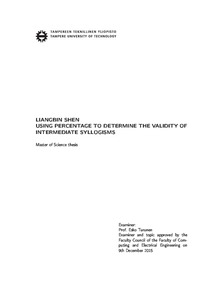Using percentage to determine the validity of intermediate syllogisms
Shen, Liangbin (2016)
Shen, Liangbin
2016
Master's Degree Programme in Information Technology
Tieto- ja sähkötekniikan tiedekunta - Faculty of Computing and Electrical Engineering
This publication is copyrighted. You may download, display and print it for Your own personal use. Commercial use is prohibited.
Hyväksymispäivämäärä
2016-01-13
Julkaisun pysyvä osoite on
https://urn.fi/URN:NBN:fi:tty-201512281854
https://urn.fi/URN:NBN:fi:tty-201512281854
Tiivistelmä
Syllogism is a branch of logic which is related to mathematics and philosophy very much. A syllogism is a kind of logical argument which has two or more propositions that are asserted to be true and a conclusion is given based on the propositions. Aristotelian syllogisms are well known as they are the oldest and most classical syllogism. They include three parts: the major premise, the miner premise, and the conclusion. With the development of the study of mathematics, 24 valid ones of Aristotelian syllogisms have been found.
Intermediate syllogisms are extensions of Aristotelian syllogisms. They also include the same three parts. However, there are more than two quantifiers while the Aristotle syllogisms have two quantifiers "All" and "Some". Peterson's Intermediate syllogisms have five quantifiers and many studies about this kind of syllogism have been done by L. Peterson, Turunen and etc. This thesis will first talk about the work done by others and then a new terminology will be introduced to determine the validity of Intermediate syllogisms. At last, some examples will be given for testing.
Intermediate syllogisms are extensions of Aristotelian syllogisms. They also include the same three parts. However, there are more than two quantifiers while the Aristotle syllogisms have two quantifiers "All" and "Some". Peterson's Intermediate syllogisms have five quantifiers and many studies about this kind of syllogism have been done by L. Peterson, Turunen and etc. This thesis will first talk about the work done by others and then a new terminology will be introduced to determine the validity of Intermediate syllogisms. At last, some examples will be given for testing.
